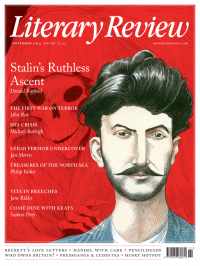Simon Heffer
In Camera
Anyone who has read New Grub Street will know that the difficulties of making a living writing books have been around for a long time. Some writers are blessed with private incomes, rich spouses or a love of asceticism that leaves them unhindered in the pursuit of the literary life. Others rely on a tenured post in academia, with its encouragement to spend extensive periods in well-stocked libraries, archives and manuscript stores, to supplement meagre earnings from scholarship. Many writers of non-fiction have to fit in literary work with a day job, such as journalism or broadcasting or (in the manner of T S Eliot) working in an office. It limits the time one can spend in archives, and if one wishes to write books using original material – and it is always pleasing if one can – that imposes a serious restraint. I have the good fortune to be able to spend one day a week in archives researching my next book, but I am still squeezed for time. Others are less fortunate: researching a book means forgoing the annual holiday or going part-time and never hoping to recoup lost earnings.
Technology, however, has helped in many ways. Most obviously there is the internet, allowing access to primary sources that used only to be available in libraries, during the restrictive hours in which libraries operate. Many letters are digitised – think of the project Cambridge University has undertaken to get Charles

Sign Up to our newsletter
Receive free articles, highlights from the archive, news, details of prizes, and much more.@Lit_Review
Follow Literary Review on Twitter
Twitter Feed
Under its longest-serving editor, Graydon Carter, Vanity Fair was that rare thing – a New York society magazine that published serious journalism.
@PeterPeteryork looks at what Carter got right.
Peter York - Deluxe Editions
Peter York: Deluxe Editions - When the Going Was Good: An Editor’s Adventures During the Last Golden Age of Magazines by Graydon Carter
literaryreview.co.uk
Henry James returned to America in 1904 with three objectives: to see his brother William, to deliver a series of lectures on Balzac, and to gather material for a pair of books about modern America.
Peter Rose follows James out west.
Peter Rose - The Restless Analyst
Peter Rose: The Restless Analyst - Henry James Comes Home: Rediscovering America in the Gilded Age by Peter Brooks...
literaryreview.co.uk
Vladimir Putin served his apprenticeship in the KGB toward the end of the Cold War, a period during which Western societies were infiltrated by so-called 'illegals'.
Piers Brendon examines how the culture of Soviet spycraft shaped his thinking.
Piers Brendon - Tinker, Tailor, Sleeper, Troll
Piers Brendon: Tinker, Tailor, Sleeper, Troll - The Illegals: Russia’s Most Audacious Spies and the Plot to Infiltrate the West by Shaun Walker
literaryreview.co.uk